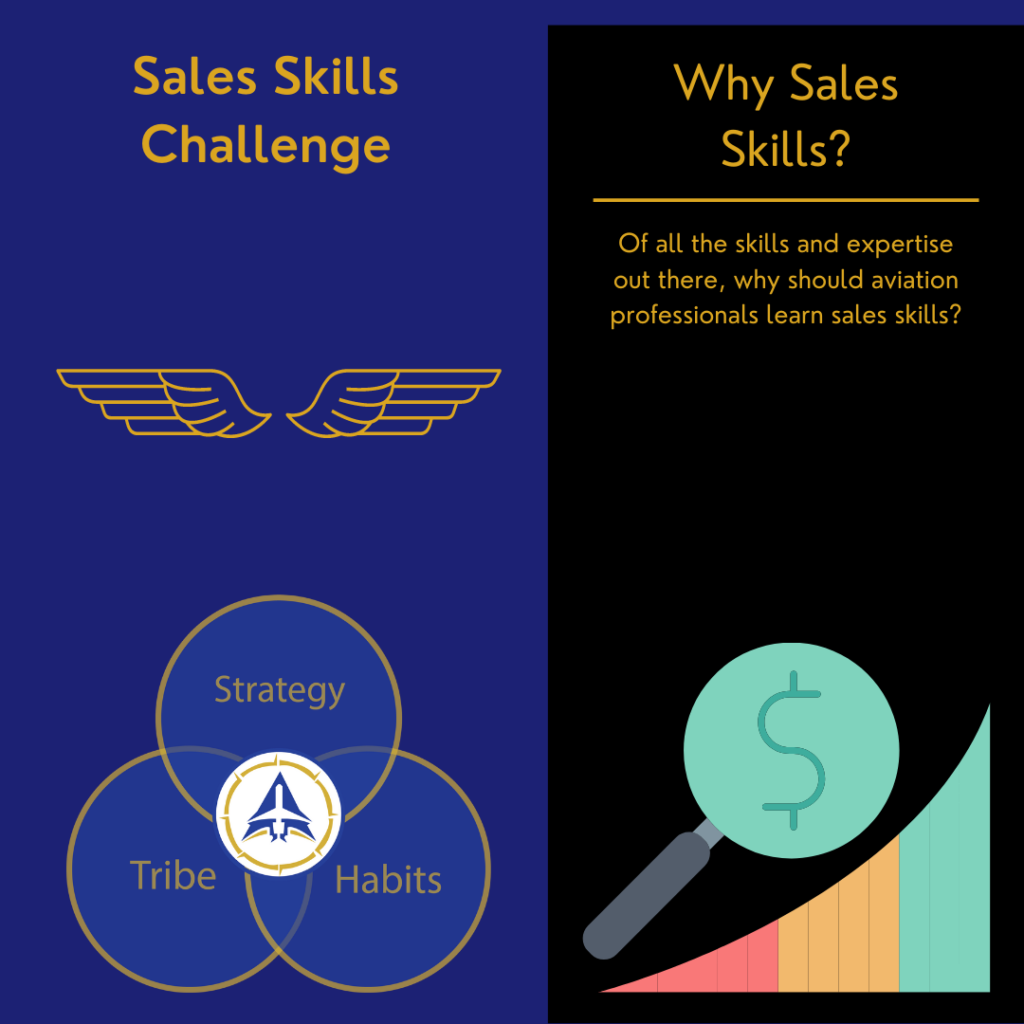Many aviation professionals would rather scrub oil off the hangar floor than sell.
Which I totally understand – it certainly wasn’t MY favorite thing to do when I started my own company.
And I almost killed my new venture several times just out of my own avoidance of making sales calls!
I’ve learned to make my peace with it, and like many things that are challenging, I’ve learned to enjoy it. And I VERY MUCH like teaching aviation professionals to succeed where they thought they could not.
Here’s why aviation industry professionals should learn sales skills, in three short stories:
Hey!
Today, I’ve got a little bit of a monologue or a rant, if you want to call it that. What I wanted to talk about today is why aviation professionals need to learn sales skills. A lot of aviation professionals would really rather be doing just about anything besides selling, but it’s really important for all of us to be able to sell our ideas and to be able to sell our products and services, especially in an economy like this one. So I’ve got three really quick stories that I wanted to share with you. The first one is my dad used to work for what used to be called Mountain Bell. And my dad’s no longer with us, but we spent a lot of time talking, especially when I got older about some things that he was concerned about and that I was concerned about as I was getting into the business world and things like that.

So there was a time when he needed to hire for an open position at Mountain Bell, and one of the people that applied for the job was a “trust fund baby”, meaning someone who was independently wealthy. He had his own source of income. He had some kind of an annuity or something like that, so he was getting a lot of money every month for just waking up. So my dad was concerned about, should we give the job to this person? Should we give it to someone who really needs it? He came to the conclusion that he needed to hire this guy because he really was the most qualified for that position and they really needed the skills that this guy had. Another concern that he had is, is this guy really even going to want to work? Is he going to show up at 10 o’clock every morning or sleeping an hour past when everybody else shows up and not care about getting fired or anything else, because he doesn’t really have a financial incentive to be there?
So those were the concerns that he had. But as it turned out, this person was the best employee that my dad ever had, and he told me this years later. And he thought part of the reason was because this guy didn’t have to make decisions based on money. He didn’t have to worry about pleasing people by telling them what they wanted to hear and things like that. So he felt like this guy was really, really ethical because he was financially independent. And the best way to be financially independent is to have an in demand skill. And, of course, sales is one of the most in demand skills. We’ve heard it before that if you know how to sell, you’ll never be looking for a job, jobs will be looking for you. Okay. So that’s story number one. Story number two is, I used to work for a bank and there was a time when banks were in the news all the time, because of some unsavory things that were going on at these banks.
And, of course, when you work at a bank, you wonder to yourself sometimes, if something like that happened, if my boss were involved in something that was unsavory or whatever the situation was, what would I do? Would I be implicated in that? Would I have to go along with something that was distasteful or illegal, immoral, or fattening? Or could I quit? And if I did quit, what effect would that have on my family? So the reality is I started my own company because I was concerned about that. The nice thing is, if you’ve got sales skills, you can always find a job and you can always move from one company to another. If you don’t like the product, you don’t like the service, you don’t like what’s going on, something doesn’t smell, any of those things, you always have good options.
Story number three is really more about the industry than about people in general, and that’s in November of 2008, this was during the crash, this is ancient history to some of us, but this was in Reuters. “Congress is taking a hard look at Detroit’s autos these days. But what about Detroit’s jets? When the chief executives from Ford and General Motors flew to Washington yesterday to ask Congress for a $25 billion lifeline, they didn’t fly coach. General Motors CEO Rick Wagoner arrived on his company’s cushy Gulf Stream Four.” ABC news reported, “Ford CEO Alan Malali flew in on his company’s private jet as well. It costs about $20,000 to fly one of these jets round trip from Detroit to Chicago, far more than the $900 cost of a first class ticket on Northwest Airlines,” ABC said. Wagoner told ABC he took the private jet because he’s a busy guy. Malali declined to comment.
So it’s not exactly news, and it just hit everybody completely the wrong way. And the interesting thing is the whole industry shut down right after that. They didn’t want to mention anybody. Any company that had a private jet just went dark and went quiet and stopped talking about private aviation for months. In fact, it wasn’t until February of 2009 that the National Business Aviation Association and the General Aviation Manufacturers association, that’s NBAA and GAMA to those of us who speak acronyms, joined forces to launch the No Plane No Gain Initiative, which highlights the important contributions of general aviation, including business aviation, to cities, companies, and communities. So they started telling good stories about private aviation and business aviation, but it was too little and too late, in my opinion. A lot of damage had been done in what we call jet shaming. People were, and still are a lot of times, don’t want their shareholders, their customers, other people to know if they’re using private aviation, just because it looks bad.
And that’s unfortunate because, if we told the story the right way and said, “You know what? This saves this person X amount of time, and that’s worth X amount of money”, or, “they can make four or five different sales appointments, which makes this amount of money for that company, there are really good stories to be told. But the people who tell the stories are the ones that rule the world. And all of that is sales. One side was selling one story, the other side was not selling their story as well. We really do need to have good salespeople and good storytellers and good people in aviation. So sales skills themselves are neutral. It’s what you do with them that matters. There’s that quote from Edmund Burke. “The only thing necessary for the triumph of evil is for good men to do nothing.” The only thing that needs to happen in order for the economy to fall apart or for the worst companies to triumph is to have all of the salespeople be bad people.
But we really, really, really need good people and we really need good aviation people with good sales skills who are able to tell stories and who are able to convince people of our point of view. So that’s why those three stories, basically my dad’s trust fund baby story, my working for a bank story, and then, the fat cats flying to Washington D.C. story that really encapsulates my reasoning for why the aviation industry really needs to have good, honest, ethical, positive role models in sales and really has to have some people who are really good at it in order for the industry to survive. So that’s why we’re doing our Aviation Sales Basics Course so that a lot of those really good ethical people that we already know, like, and, trust can learn some skills to help them be more effective in sales. So, anyway, hope you enjoyed the stories and hope you agree. Let us know what you think in the comments. And we’ll talk to you soon.



